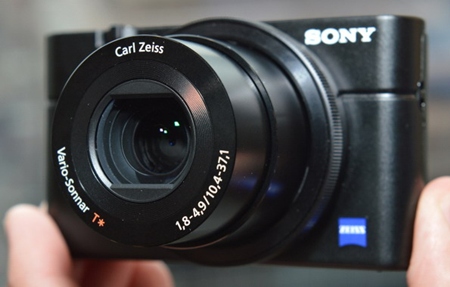Fairly recently I covered the subject of the battle between mobile phone photography and compact camera photography results. The results were as could be expected – the mobile phone pictures were instant, immediate, and looked great, whilst the compact camera photos were sharper, better saturated and again were ‘instant’ – provided you took your camera with you. And that is one of the prime differences. Everyone carries a mobile phone these days at all times, but to carry a camera means commitment.
To withstand the onslaught of the mobile phone, iPad or whatever, the dedicated camera manufacturers have had to lift their game, and this has meant zoom lenses with a greater range, while at the same time producing sharper pictures with higher resolution.

The latest to present their offering is Sony with the RX100. This camera is getting rave reviews, so looking out for one might be a good idea, if it is as good as it is claimed. Mind you, I am not talking about the manufacturer’s claims, I am talking about camera magazine reviews. One reviewer even went so far as to say it was “the best pocket camera ever made.” He went on to write, “No photos this good have ever come from a camera this small.”
The technology that Sony has packed into this pocket camera includes a very large (one inch) sensor. That is coming up to low end SLR specifications, and much larger than previous compact cameras.
The advantage of the big sensor is less grain in low light, better color depth and great dynamic range (the spectrum from darkest to lightest). This comes from the increased number of pixels on the larger sensor. This sensor also makes it easy for the amateur photographer to attain that sharp focus foreground subject in front of an out of focus soft background.
I have written many times that the final arbiter in producing sharp pictures comes down to the standard of the glass being used in the front of the camera. The RX100 has a Carl Zeiss lens, which has a maximum aperture of f/1.8. That’s the widest aperture you can buy on a pocket camera. Another optical factor in the sharp foreground and soft backgrounds and the ability to get good images in low light.
According to those who have tried this camera (not due for release till later this month, though Thailand may get it later next year), the claims are for extreme details, great color range with depth and clarity, a ‘burst’ mode of 10 frames per second (yes 10!) and a macro setting allowing you to get down to five centimeters, whilst most SLR’s can’t get any closer than 25 centimeters from the subject.
What may put some people off this camera are the various “gimmicky” electronic features like an SLR, with automated modes. These include Illustration (turns the photo into a colorful line drawing), High Dynamic Range Painting and the Auto Crop which creates a duplicate of your portrait, cropped in what it considers a better way. And Sweep Panorama. You swing the camera around you in an arc, pressing the shutter button the whole time. When you stop, there, on your screen, is a finished, seamless, 220-degree panorama. It’s the ultimate ‘wide-angle’ lens. One feature which will endear itself to the female Thai population are the two methods of producing “selfies”. You can set a timer as usual, or use its smarter mode, in which the camera waits until it sees the photographer’s face in the frame, after which it shoots a self portrait every three seconds until your face leaves the viewfinder.
There is no eye-level viewfinder (an item I enjoy, much more than the screen), but again it is claimed that by placing an extra white pixel in with every red, green and blue, the screen remains clear and viewable even in bright sunshine.
The lens ring controls the zoom, focus, exposure and aperture, so keeps many functions easily under your control. There is no ‘click’ between the settings, something that can make aperture a little hit and miss, for example.
The price in Australia is $650, which is not cheap for a pocket camera.




